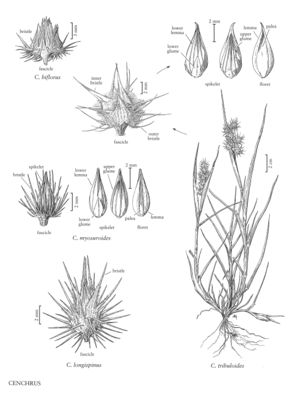Cenchrus myosuroides
Plants perennial. Culms 5-200 cm, stout, glaucous. Sheaths from shorter than to equaling the internodes; ligules 1.5-2(3.4) mm; blades 12-40 cm long, 4-13 mm wide, glabrous or sparsely pilose adaxially. Panicles 4-23 cm; fascicles 3.8-8 mm long, 1.2-2.6 mm wide, composed of several whorls of bristles, not burlike; bristles 3-5.8 mm long, 0.2-0.6 mm wide, fused only at the base, not forming a cupule, terete, increasing in size inwards, inner bristles pubescent on the lower 1/2 - 2/3. Spikelets 1(2-3) per fascicle, 3.8-4.8(5.6) mm. Lower glumes 1.5-3 mm; upper glumes 3-5 mm, 3-5-veined; lower lemmas 3-5.5 mm; upper lemmas 3.8-5.4 mm; anthers 0.8-2.2 mm. Caryopses 1.5-2.6 mm long, 1-1.5 mm wide, ovoid. 2n = (54), 70.
Distribution
Puerto Rico, Tex., La., Ala., Ga., S.C., Fla.
Discussion
Cenchrus myosuroides is a native species that grows mostly along roadsides and in other waste places. Its native range extends through the Caribbean and Central America to northern South America.
Selected References
None.
